Commercial Law Individual Assignment Solution - LLW2008, S1B1 2020
VerifiedAdded on 2022/08/17
|10
|1854
|10
Homework Assignment
AI Summary
This document presents a comprehensive solution to a Commercial Law assignment, addressing several scenarios related to a furniture store, 'Flora's Futons and other Furniture.' The assignment explores various legal issues, including contract formation, breach of contract, consumer rights, and the rights of a casual employee. The solution analyzes each question using relevant case law, such as Photo Production Ltd vs Securicor Transport Ltd, Australian Woollen Mills Pty Ltd vs The Commonwealth, and the Fair Work Act 2009. The analysis covers topics like refund eligibility, the validity of sales made by agents, and the rights of employees. The solution provides a detailed explanation of the legal principles and their application to the facts, offering a clear and well-supported response to each question posed in the assignment brief. The assignment showcases a deep understanding of commercial law principles and the ability to apply them to complex scenarios.
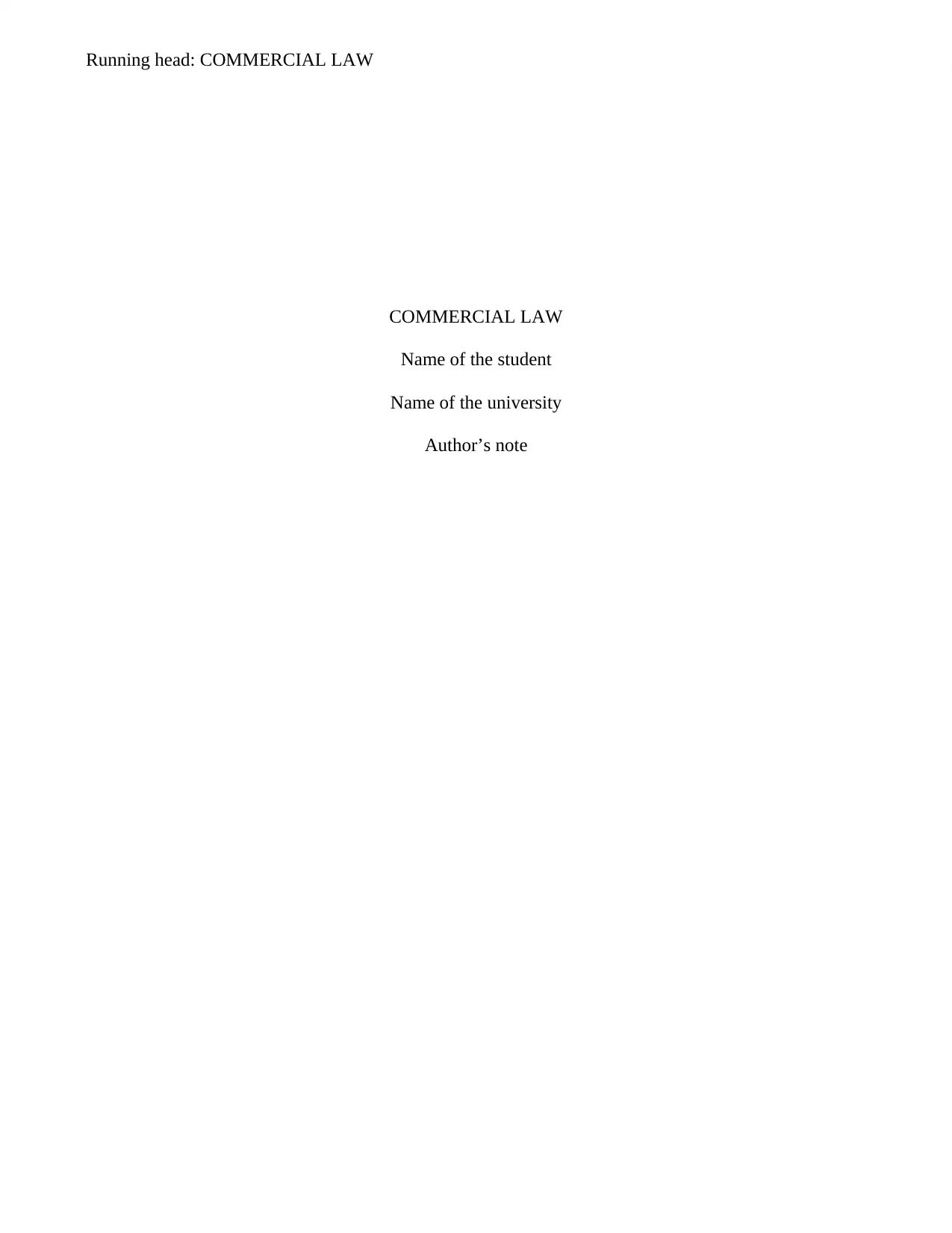
0
Running head: COMMERCIAL LAW
COMMERCIAL LAW
Name of the student
Name of the university
Author’s note
Running head: COMMERCIAL LAW
COMMERCIAL LAW
Name of the student
Name of the university
Author’s note
Paraphrase This Document
Need a fresh take? Get an instant paraphrase of this document with our AI Paraphraser
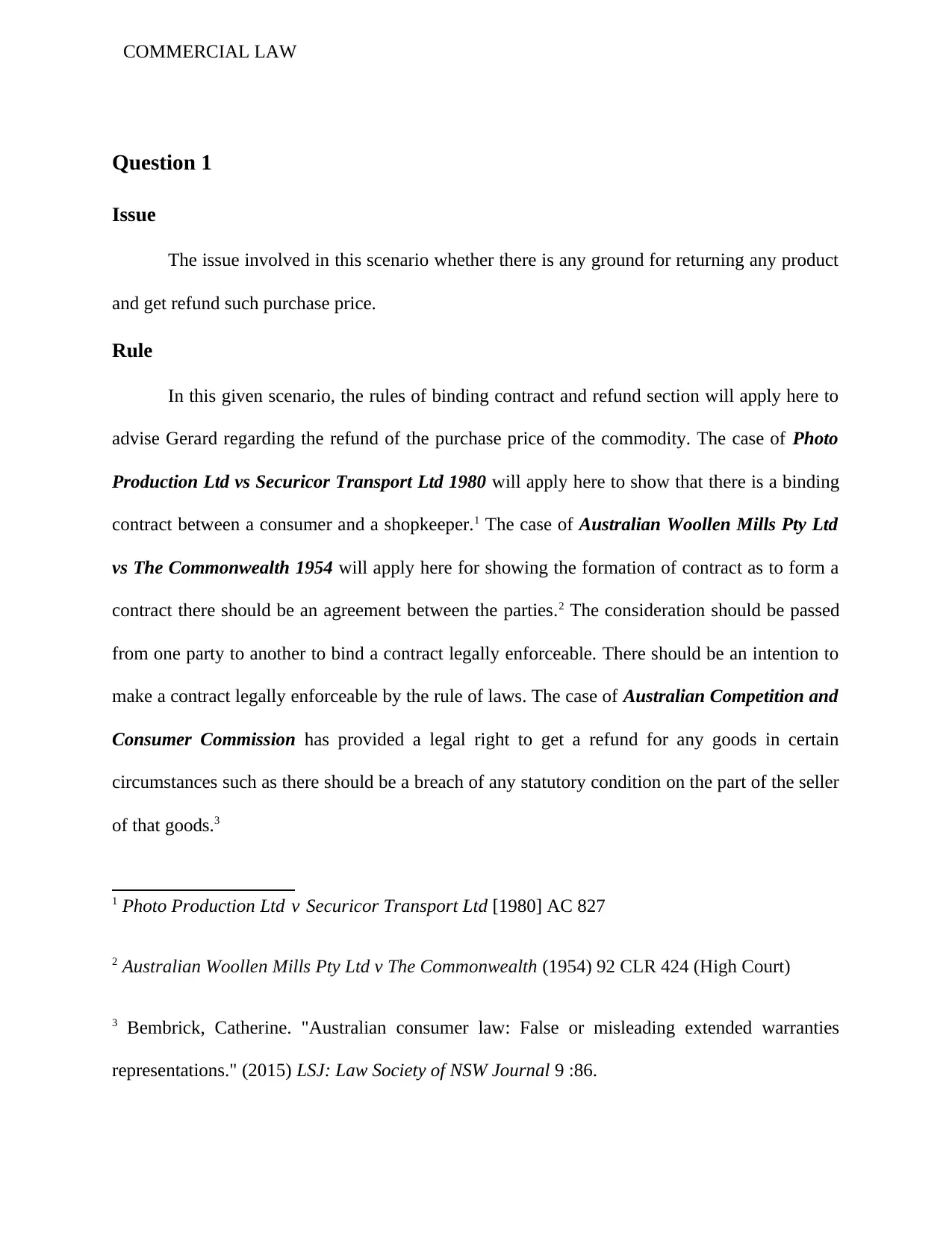
1
COMMERCIAL LAW
Question 1
Issue
The issue involved in this scenario whether there is any ground for returning any product
and get refund such purchase price.
Rule
In this given scenario, the rules of binding contract and refund section will apply here to
advise Gerard regarding the refund of the purchase price of the commodity. The case of Photo
Production Ltd vs Securicor Transport Ltd 1980 will apply here to show that there is a binding
contract between a consumer and a shopkeeper.1 The case of Australian Woollen Mills Pty Ltd
vs The Commonwealth 1954 will apply here for showing the formation of contract as to form a
contract there should be an agreement between the parties.2 The consideration should be passed
from one party to another to bind a contract legally enforceable. There should be an intention to
make a contract legally enforceable by the rule of laws. The case of Australian Competition and
Consumer Commission has provided a legal right to get a refund for any goods in certain
circumstances such as there should be a breach of any statutory condition on the part of the seller
of that goods.3
1 Photo Production Ltd v Securicor Transport Ltd [1980] AC 827
2 Australian Woollen Mills Pty Ltd v The Commonwealth (1954) 92 CLR 424 (High Court)
3 Bembrick, Catherine. "Australian consumer law: False or misleading extended warranties
representations." (2015) LSJ: Law Society of NSW Journal 9 :86.
COMMERCIAL LAW
Question 1
Issue
The issue involved in this scenario whether there is any ground for returning any product
and get refund such purchase price.
Rule
In this given scenario, the rules of binding contract and refund section will apply here to
advise Gerard regarding the refund of the purchase price of the commodity. The case of Photo
Production Ltd vs Securicor Transport Ltd 1980 will apply here to show that there is a binding
contract between a consumer and a shopkeeper.1 The case of Australian Woollen Mills Pty Ltd
vs The Commonwealth 1954 will apply here for showing the formation of contract as to form a
contract there should be an agreement between the parties.2 The consideration should be passed
from one party to another to bind a contract legally enforceable. There should be an intention to
make a contract legally enforceable by the rule of laws. The case of Australian Competition and
Consumer Commission has provided a legal right to get a refund for any goods in certain
circumstances such as there should be a breach of any statutory condition on the part of the seller
of that goods.3
1 Photo Production Ltd v Securicor Transport Ltd [1980] AC 827
2 Australian Woollen Mills Pty Ltd v The Commonwealth (1954) 92 CLR 424 (High Court)
3 Bembrick, Catherine. "Australian consumer law: False or misleading extended warranties
representations." (2015) LSJ: Law Society of NSW Journal 9 :86.
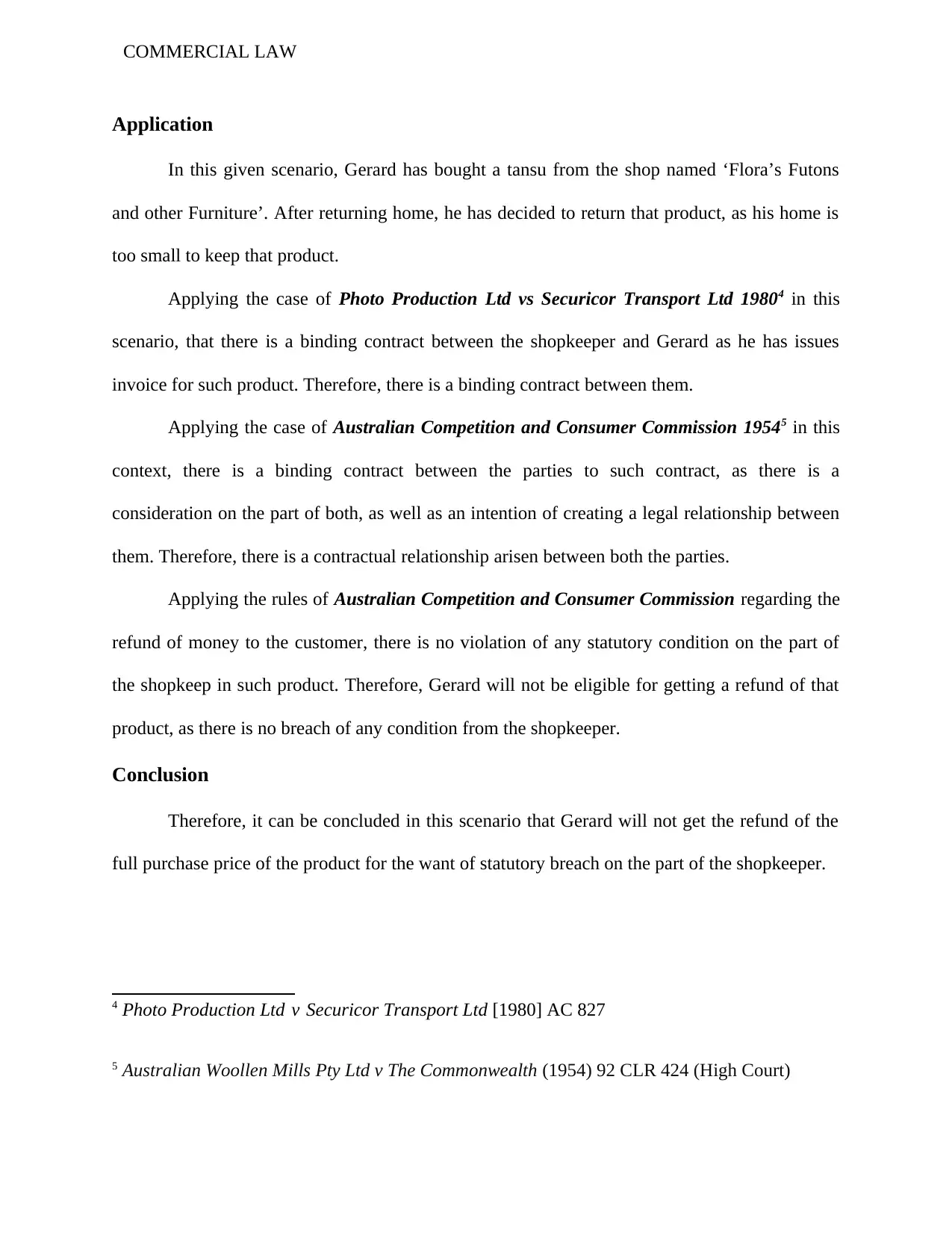
2
COMMERCIAL LAW
Application
In this given scenario, Gerard has bought a tansu from the shop named ‘Flora’s Futons
and other Furniture’. After returning home, he has decided to return that product, as his home is
too small to keep that product.
Applying the case of Photo Production Ltd vs Securicor Transport Ltd 19804 in this
scenario, that there is a binding contract between the shopkeeper and Gerard as he has issues
invoice for such product. Therefore, there is a binding contract between them.
Applying the case of Australian Competition and Consumer Commission 19545 in this
context, there is a binding contract between the parties to such contract, as there is a
consideration on the part of both, as well as an intention of creating a legal relationship between
them. Therefore, there is a contractual relationship arisen between both the parties.
Applying the rules of Australian Competition and Consumer Commission regarding the
refund of money to the customer, there is no violation of any statutory condition on the part of
the shopkeep in such product. Therefore, Gerard will not be eligible for getting a refund of that
product, as there is no breach of any condition from the shopkeeper.
Conclusion
Therefore, it can be concluded in this scenario that Gerard will not get the refund of the
full purchase price of the product for the want of statutory breach on the part of the shopkeeper.
4 Photo Production Ltd v Securicor Transport Ltd [1980] AC 827
5 Australian Woollen Mills Pty Ltd v The Commonwealth (1954) 92 CLR 424 (High Court)
COMMERCIAL LAW
Application
In this given scenario, Gerard has bought a tansu from the shop named ‘Flora’s Futons
and other Furniture’. After returning home, he has decided to return that product, as his home is
too small to keep that product.
Applying the case of Photo Production Ltd vs Securicor Transport Ltd 19804 in this
scenario, that there is a binding contract between the shopkeeper and Gerard as he has issues
invoice for such product. Therefore, there is a binding contract between them.
Applying the case of Australian Competition and Consumer Commission 19545 in this
context, there is a binding contract between the parties to such contract, as there is a
consideration on the part of both, as well as an intention of creating a legal relationship between
them. Therefore, there is a contractual relationship arisen between both the parties.
Applying the rules of Australian Competition and Consumer Commission regarding the
refund of money to the customer, there is no violation of any statutory condition on the part of
the shopkeep in such product. Therefore, Gerard will not be eligible for getting a refund of that
product, as there is no breach of any condition from the shopkeeper.
Conclusion
Therefore, it can be concluded in this scenario that Gerard will not get the refund of the
full purchase price of the product for the want of statutory breach on the part of the shopkeeper.
4 Photo Production Ltd v Securicor Transport Ltd [1980] AC 827
5 Australian Woollen Mills Pty Ltd v The Commonwealth (1954) 92 CLR 424 (High Court)
⊘ This is a preview!⊘
Do you want full access?
Subscribe today to unlock all pages.

Trusted by 1+ million students worldwide
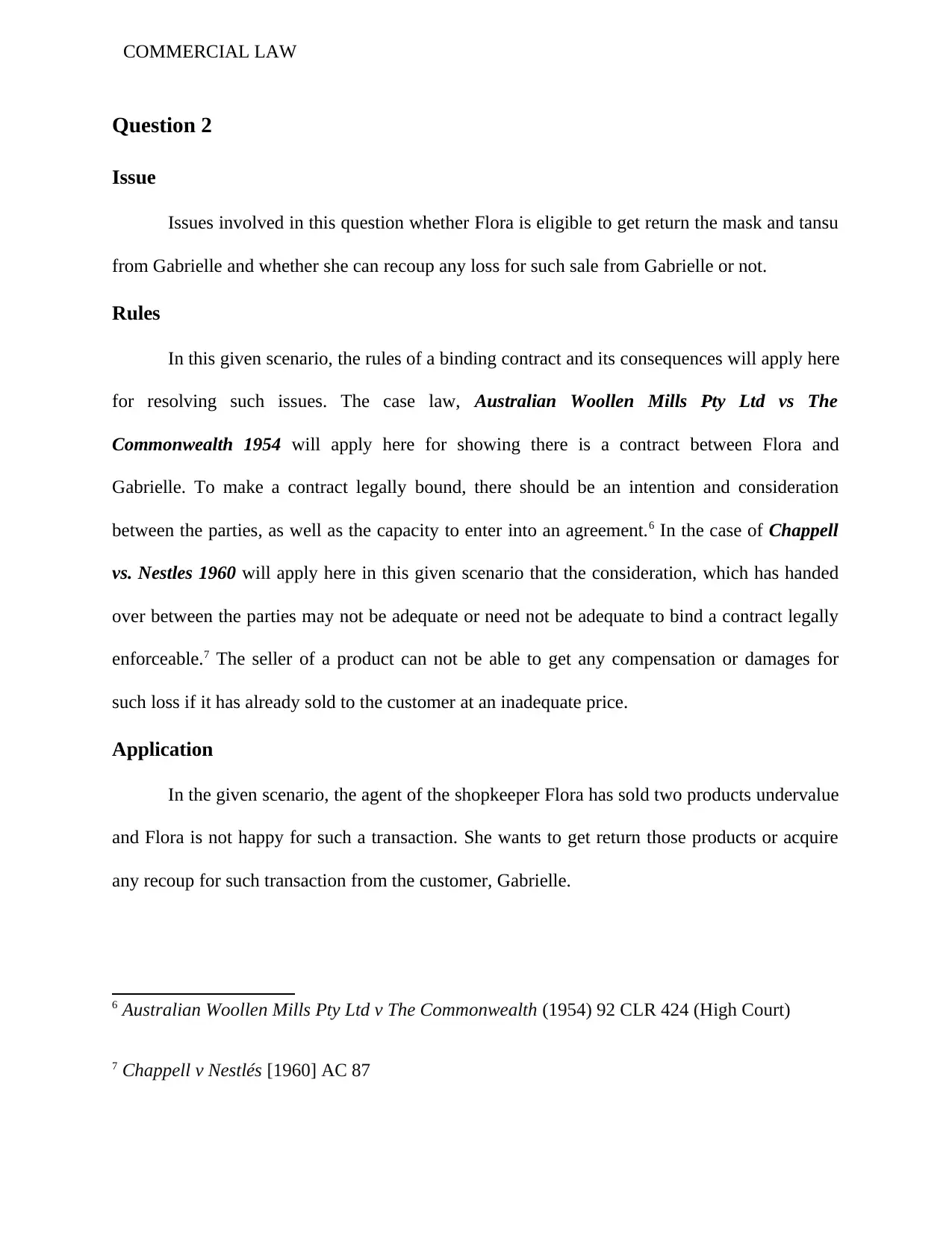
3
COMMERCIAL LAW
Question 2
Issue
Issues involved in this question whether Flora is eligible to get return the mask and tansu
from Gabrielle and whether she can recoup any loss for such sale from Gabrielle or not.
Rules
In this given scenario, the rules of a binding contract and its consequences will apply here
for resolving such issues. The case law, Australian Woollen Mills Pty Ltd vs The
Commonwealth 1954 will apply here for showing there is a contract between Flora and
Gabrielle. To make a contract legally bound, there should be an intention and consideration
between the parties, as well as the capacity to enter into an agreement.6 In the case of Chappell
vs. Nestles 1960 will apply here in this given scenario that the consideration, which has handed
over between the parties may not be adequate or need not be adequate to bind a contract legally
enforceable.7 The seller of a product can not be able to get any compensation or damages for
such loss if it has already sold to the customer at an inadequate price.
Application
In the given scenario, the agent of the shopkeeper Flora has sold two products undervalue
and Flora is not happy for such a transaction. She wants to get return those products or acquire
any recoup for such transaction from the customer, Gabrielle.
6 Australian Woollen Mills Pty Ltd v The Commonwealth (1954) 92 CLR 424 (High Court)
7 Chappell v Nestlés [1960] AC 87
COMMERCIAL LAW
Question 2
Issue
Issues involved in this question whether Flora is eligible to get return the mask and tansu
from Gabrielle and whether she can recoup any loss for such sale from Gabrielle or not.
Rules
In this given scenario, the rules of a binding contract and its consequences will apply here
for resolving such issues. The case law, Australian Woollen Mills Pty Ltd vs The
Commonwealth 1954 will apply here for showing there is a contract between Flora and
Gabrielle. To make a contract legally bound, there should be an intention and consideration
between the parties, as well as the capacity to enter into an agreement.6 In the case of Chappell
vs. Nestles 1960 will apply here in this given scenario that the consideration, which has handed
over between the parties may not be adequate or need not be adequate to bind a contract legally
enforceable.7 The seller of a product can not be able to get any compensation or damages for
such loss if it has already sold to the customer at an inadequate price.
Application
In the given scenario, the agent of the shopkeeper Flora has sold two products undervalue
and Flora is not happy for such a transaction. She wants to get return those products or acquire
any recoup for such transaction from the customer, Gabrielle.
6 Australian Woollen Mills Pty Ltd v The Commonwealth (1954) 92 CLR 424 (High Court)
7 Chappell v Nestlés [1960] AC 87
Paraphrase This Document
Need a fresh take? Get an instant paraphrase of this document with our AI Paraphraser
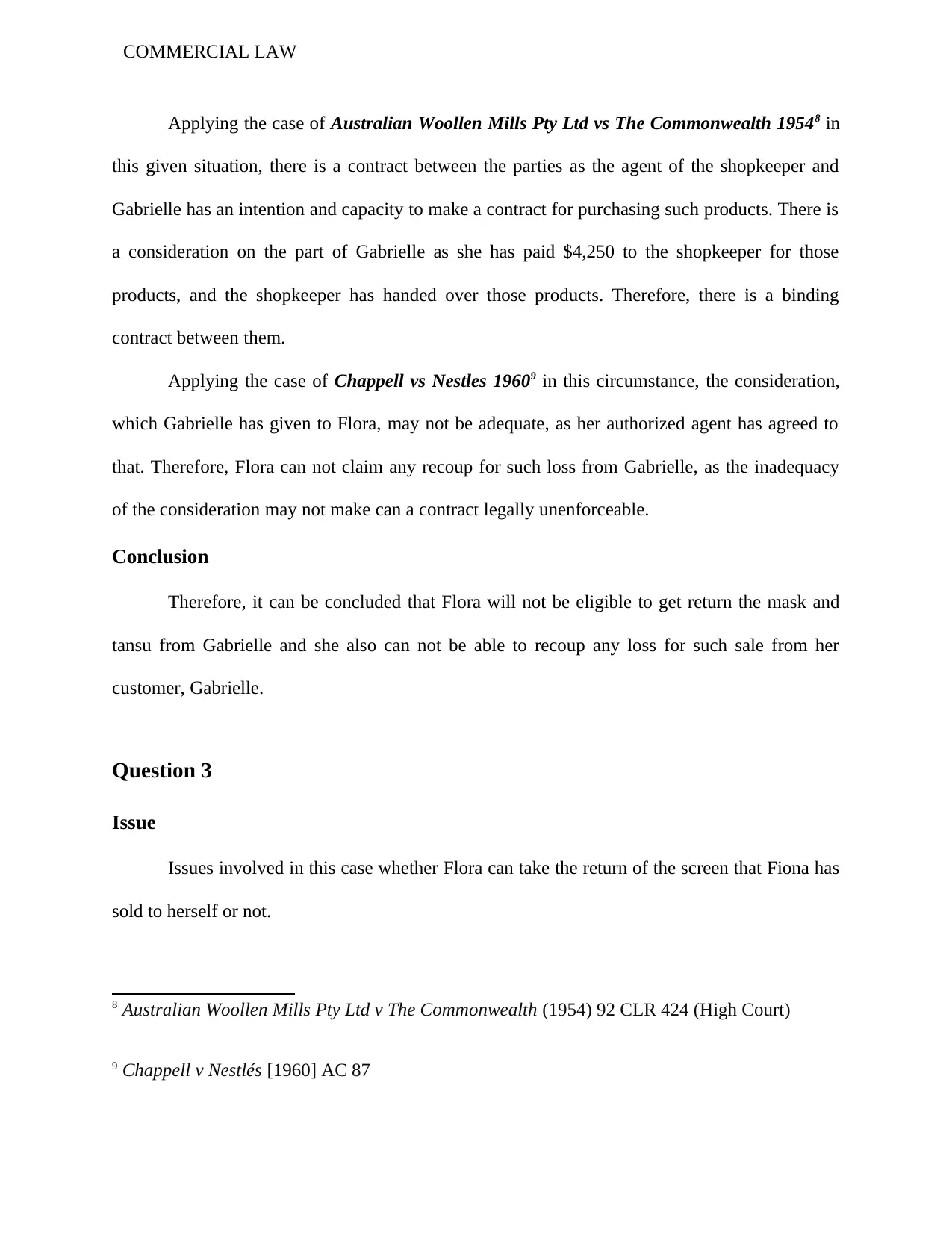
4
COMMERCIAL LAW
Applying the case of Australian Woollen Mills Pty Ltd vs The Commonwealth 19548 in
this given situation, there is a contract between the parties as the agent of the shopkeeper and
Gabrielle has an intention and capacity to make a contract for purchasing such products. There is
a consideration on the part of Gabrielle as she has paid $4,250 to the shopkeeper for those
products, and the shopkeeper has handed over those products. Therefore, there is a binding
contract between them.
Applying the case of Chappell vs Nestles 19609 in this circumstance, the consideration,
which Gabrielle has given to Flora, may not be adequate, as her authorized agent has agreed to
that. Therefore, Flora can not claim any recoup for such loss from Gabrielle, as the inadequacy
of the consideration may not make can a contract legally unenforceable.
Conclusion
Therefore, it can be concluded that Flora will not be eligible to get return the mask and
tansu from Gabrielle and she also can not be able to recoup any loss for such sale from her
customer, Gabrielle.
Question 3
Issue
Issues involved in this case whether Flora can take the return of the screen that Fiona has
sold to herself or not.
8 Australian Woollen Mills Pty Ltd v The Commonwealth (1954) 92 CLR 424 (High Court)
9 Chappell v Nestlés [1960] AC 87
COMMERCIAL LAW
Applying the case of Australian Woollen Mills Pty Ltd vs The Commonwealth 19548 in
this given situation, there is a contract between the parties as the agent of the shopkeeper and
Gabrielle has an intention and capacity to make a contract for purchasing such products. There is
a consideration on the part of Gabrielle as she has paid $4,250 to the shopkeeper for those
products, and the shopkeeper has handed over those products. Therefore, there is a binding
contract between them.
Applying the case of Chappell vs Nestles 19609 in this circumstance, the consideration,
which Gabrielle has given to Flora, may not be adequate, as her authorized agent has agreed to
that. Therefore, Flora can not claim any recoup for such loss from Gabrielle, as the inadequacy
of the consideration may not make can a contract legally unenforceable.
Conclusion
Therefore, it can be concluded that Flora will not be eligible to get return the mask and
tansu from Gabrielle and she also can not be able to recoup any loss for such sale from her
customer, Gabrielle.
Question 3
Issue
Issues involved in this case whether Flora can take the return of the screen that Fiona has
sold to herself or not.
8 Australian Woollen Mills Pty Ltd v The Commonwealth (1954) 92 CLR 424 (High Court)
9 Chappell v Nestlés [1960] AC 87
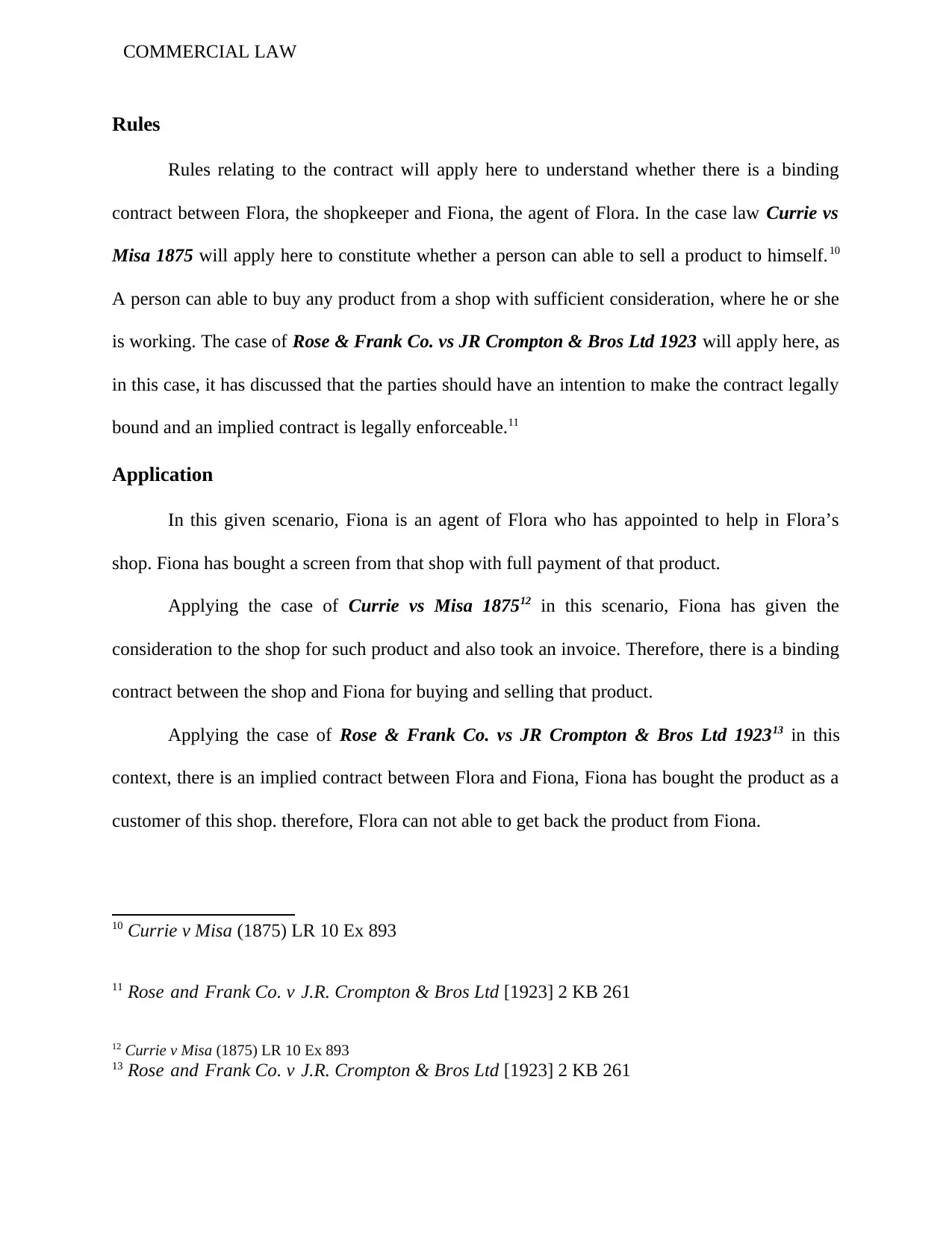
5
COMMERCIAL LAW
Rules
Rules relating to the contract will apply here to understand whether there is a binding
contract between Flora, the shopkeeper and Fiona, the agent of Flora. In the case law Currie vs
Misa 1875 will apply here to constitute whether a person can able to sell a product to himself.10
A person can able to buy any product from a shop with sufficient consideration, where he or she
is working. The case of Rose & Frank Co. vs JR Crompton & Bros Ltd 1923 will apply here, as
in this case, it has discussed that the parties should have an intention to make the contract legally
bound and an implied contract is legally enforceable.11
Application
In this given scenario, Fiona is an agent of Flora who has appointed to help in Flora’s
shop. Fiona has bought a screen from that shop with full payment of that product.
Applying the case of Currie vs Misa 187512 in this scenario, Fiona has given the
consideration to the shop for such product and also took an invoice. Therefore, there is a binding
contract between the shop and Fiona for buying and selling that product.
Applying the case of Rose & Frank Co. vs JR Crompton & Bros Ltd 192313 in this
context, there is an implied contract between Flora and Fiona, Fiona has bought the product as a
customer of this shop. therefore, Flora can not able to get back the product from Fiona.
10 Currie v Misa (1875) LR 10 Ex 893
11 Rose and Frank Co. v J.R. Crompton & Bros Ltd [1923] 2 KB 261
12 Currie v Misa (1875) LR 10 Ex 893
13 Rose and Frank Co. v J.R. Crompton & Bros Ltd [1923] 2 KB 261
COMMERCIAL LAW
Rules
Rules relating to the contract will apply here to understand whether there is a binding
contract between Flora, the shopkeeper and Fiona, the agent of Flora. In the case law Currie vs
Misa 1875 will apply here to constitute whether a person can able to sell a product to himself.10
A person can able to buy any product from a shop with sufficient consideration, where he or she
is working. The case of Rose & Frank Co. vs JR Crompton & Bros Ltd 1923 will apply here, as
in this case, it has discussed that the parties should have an intention to make the contract legally
bound and an implied contract is legally enforceable.11
Application
In this given scenario, Fiona is an agent of Flora who has appointed to help in Flora’s
shop. Fiona has bought a screen from that shop with full payment of that product.
Applying the case of Currie vs Misa 187512 in this scenario, Fiona has given the
consideration to the shop for such product and also took an invoice. Therefore, there is a binding
contract between the shop and Fiona for buying and selling that product.
Applying the case of Rose & Frank Co. vs JR Crompton & Bros Ltd 192313 in this
context, there is an implied contract between Flora and Fiona, Fiona has bought the product as a
customer of this shop. therefore, Flora can not able to get back the product from Fiona.
10 Currie v Misa (1875) LR 10 Ex 893
11 Rose and Frank Co. v J.R. Crompton & Bros Ltd [1923] 2 KB 261
12 Currie v Misa (1875) LR 10 Ex 893
13 Rose and Frank Co. v J.R. Crompton & Bros Ltd [1923] 2 KB 261
⊘ This is a preview!⊘
Do you want full access?
Subscribe today to unlock all pages.

Trusted by 1+ million students worldwide
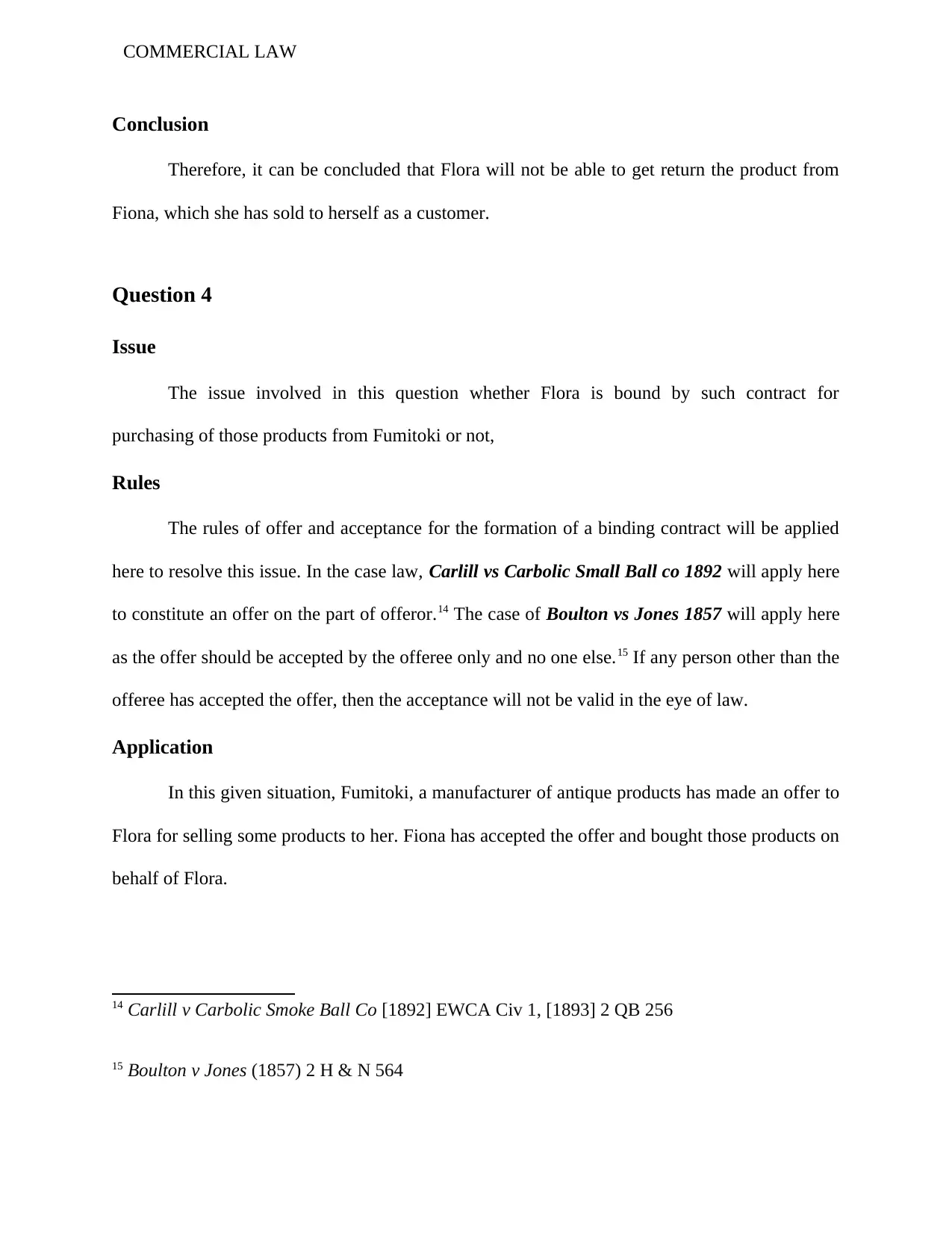
6
COMMERCIAL LAW
Conclusion
Therefore, it can be concluded that Flora will not be able to get return the product from
Fiona, which she has sold to herself as a customer.
Question 4
Issue
The issue involved in this question whether Flora is bound by such contract for
purchasing of those products from Fumitoki or not,
Rules
The rules of offer and acceptance for the formation of a binding contract will be applied
here to resolve this issue. In the case law, Carlill vs Carbolic Small Ball co 1892 will apply here
to constitute an offer on the part of offeror.14 The case of Boulton vs Jones 1857 will apply here
as the offer should be accepted by the offeree only and no one else.15 If any person other than the
offeree has accepted the offer, then the acceptance will not be valid in the eye of law.
Application
In this given situation, Fumitoki, a manufacturer of antique products has made an offer to
Flora for selling some products to her. Fiona has accepted the offer and bought those products on
behalf of Flora.
14 Carlill v Carbolic Smoke Ball Co [1892] EWCA Civ 1, [1893] 2 QB 256
15 Boulton v Jones (1857) 2 H & N 564
COMMERCIAL LAW
Conclusion
Therefore, it can be concluded that Flora will not be able to get return the product from
Fiona, which she has sold to herself as a customer.
Question 4
Issue
The issue involved in this question whether Flora is bound by such contract for
purchasing of those products from Fumitoki or not,
Rules
The rules of offer and acceptance for the formation of a binding contract will be applied
here to resolve this issue. In the case law, Carlill vs Carbolic Small Ball co 1892 will apply here
to constitute an offer on the part of offeror.14 The case of Boulton vs Jones 1857 will apply here
as the offer should be accepted by the offeree only and no one else.15 If any person other than the
offeree has accepted the offer, then the acceptance will not be valid in the eye of law.
Application
In this given situation, Fumitoki, a manufacturer of antique products has made an offer to
Flora for selling some products to her. Fiona has accepted the offer and bought those products on
behalf of Flora.
14 Carlill v Carbolic Smoke Ball Co [1892] EWCA Civ 1, [1893] 2 QB 256
15 Boulton v Jones (1857) 2 H & N 564
Paraphrase This Document
Need a fresh take? Get an instant paraphrase of this document with our AI Paraphraser
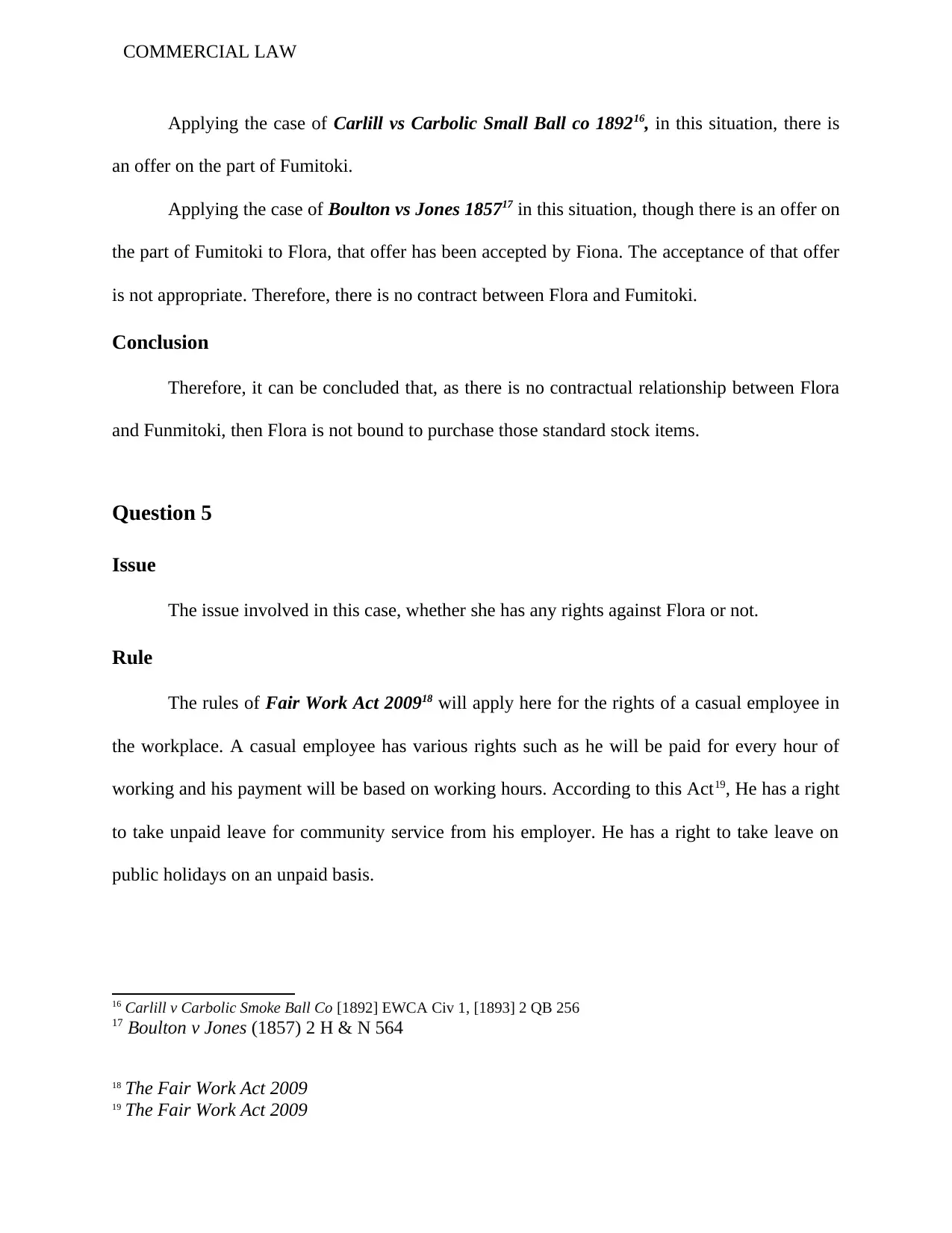
7
COMMERCIAL LAW
Applying the case of Carlill vs Carbolic Small Ball co 189216, in this situation, there is
an offer on the part of Fumitoki.
Applying the case of Boulton vs Jones 185717 in this situation, though there is an offer on
the part of Fumitoki to Flora, that offer has been accepted by Fiona. The acceptance of that offer
is not appropriate. Therefore, there is no contract between Flora and Fumitoki.
Conclusion
Therefore, it can be concluded that, as there is no contractual relationship between Flora
and Funmitoki, then Flora is not bound to purchase those standard stock items.
Question 5
Issue
The issue involved in this case, whether she has any rights against Flora or not.
Rule
The rules of Fair Work Act 200918 will apply here for the rights of a casual employee in
the workplace. A casual employee has various rights such as he will be paid for every hour of
working and his payment will be based on working hours. According to this Act19, He has a right
to take unpaid leave for community service from his employer. He has a right to take leave on
public holidays on an unpaid basis.
16 Carlill v Carbolic Smoke Ball Co [1892] EWCA Civ 1, [1893] 2 QB 256
17 Boulton v Jones (1857) 2 H & N 564
18 The Fair Work Act 2009
19 The Fair Work Act 2009
COMMERCIAL LAW
Applying the case of Carlill vs Carbolic Small Ball co 189216, in this situation, there is
an offer on the part of Fumitoki.
Applying the case of Boulton vs Jones 185717 in this situation, though there is an offer on
the part of Fumitoki to Flora, that offer has been accepted by Fiona. The acceptance of that offer
is not appropriate. Therefore, there is no contract between Flora and Fumitoki.
Conclusion
Therefore, it can be concluded that, as there is no contractual relationship between Flora
and Funmitoki, then Flora is not bound to purchase those standard stock items.
Question 5
Issue
The issue involved in this case, whether she has any rights against Flora or not.
Rule
The rules of Fair Work Act 200918 will apply here for the rights of a casual employee in
the workplace. A casual employee has various rights such as he will be paid for every hour of
working and his payment will be based on working hours. According to this Act19, He has a right
to take unpaid leave for community service from his employer. He has a right to take leave on
public holidays on an unpaid basis.
16 Carlill v Carbolic Smoke Ball Co [1892] EWCA Civ 1, [1893] 2 QB 256
17 Boulton v Jones (1857) 2 H & N 564
18 The Fair Work Act 2009
19 The Fair Work Act 2009
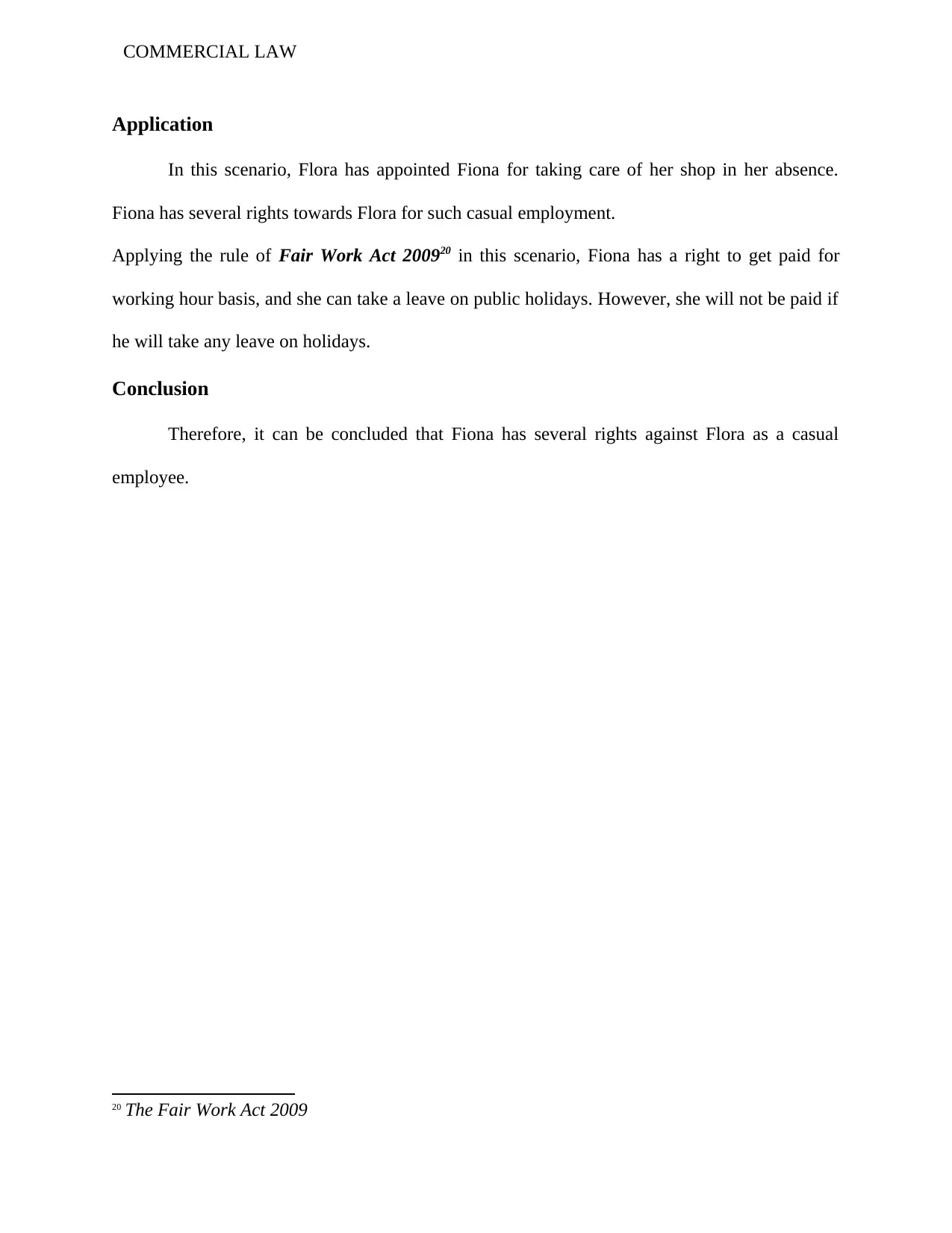
8
COMMERCIAL LAW
Application
In this scenario, Flora has appointed Fiona for taking care of her shop in her absence.
Fiona has several rights towards Flora for such casual employment.
Applying the rule of Fair Work Act 200920 in this scenario, Fiona has a right to get paid for
working hour basis, and she can take a leave on public holidays. However, she will not be paid if
he will take any leave on holidays.
Conclusion
Therefore, it can be concluded that Fiona has several rights against Flora as a casual
employee.
20 The Fair Work Act 2009
COMMERCIAL LAW
Application
In this scenario, Flora has appointed Fiona for taking care of her shop in her absence.
Fiona has several rights towards Flora for such casual employment.
Applying the rule of Fair Work Act 200920 in this scenario, Fiona has a right to get paid for
working hour basis, and she can take a leave on public holidays. However, she will not be paid if
he will take any leave on holidays.
Conclusion
Therefore, it can be concluded that Fiona has several rights against Flora as a casual
employee.
20 The Fair Work Act 2009
⊘ This is a preview!⊘
Do you want full access?
Subscribe today to unlock all pages.

Trusted by 1+ million students worldwide
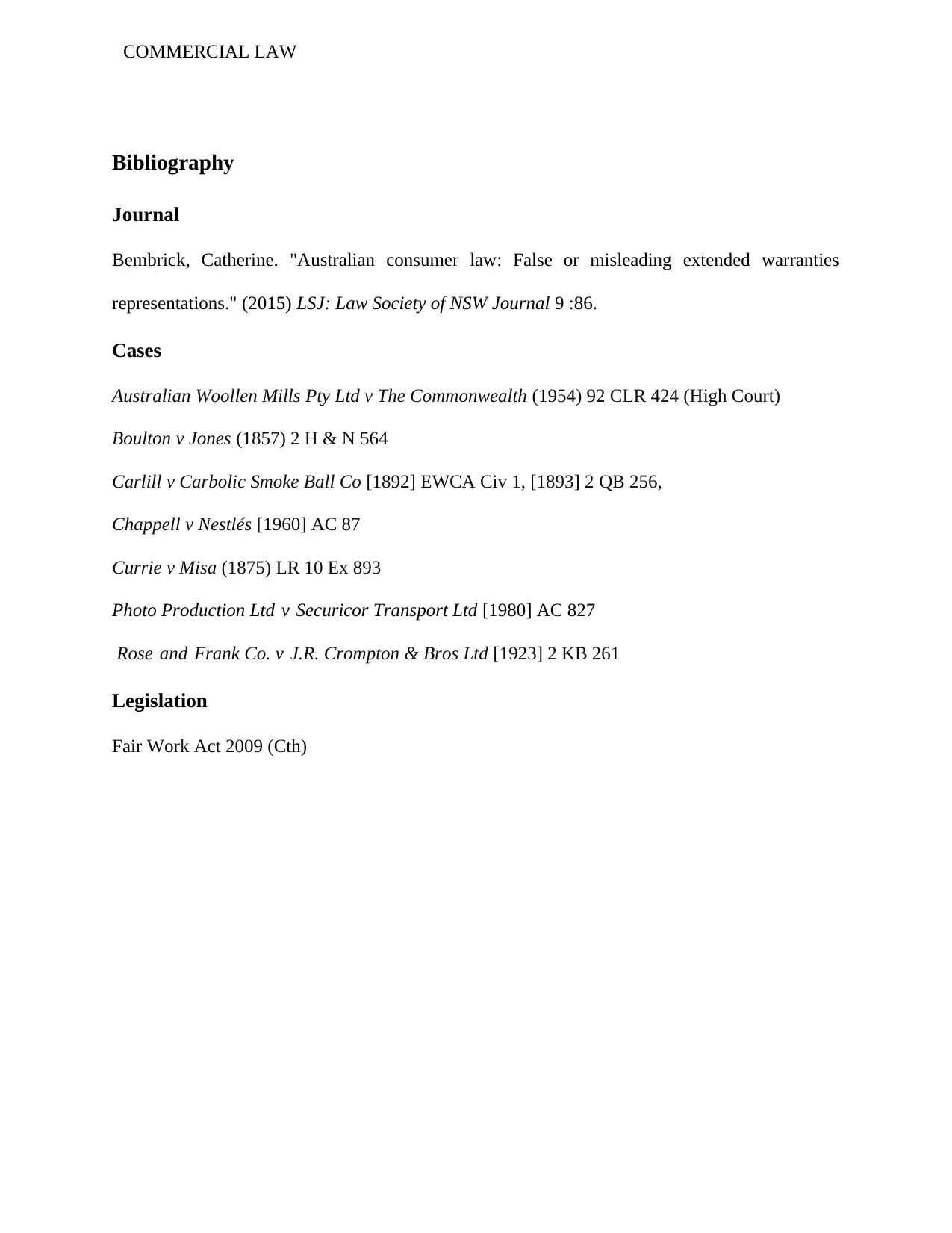
9
COMMERCIAL LAW
Bibliography
Journal
Bembrick, Catherine. "Australian consumer law: False or misleading extended warranties
representations." (2015) LSJ: Law Society of NSW Journal 9 :86.
Cases
Australian Woollen Mills Pty Ltd v The Commonwealth (1954) 92 CLR 424 (High Court)
Boulton v Jones (1857) 2 H & N 564
Carlill v Carbolic Smoke Ball Co [1892] EWCA Civ 1, [1893] 2 QB 256,
Chappell v Nestlés [1960] AC 87
Currie v Misa (1875) LR 10 Ex 893
Photo Production Ltd v Securicor Transport Ltd [1980] AC 827
Rose and Frank Co. v J.R. Crompton & Bros Ltd [1923] 2 KB 261
Legislation
Fair Work Act 2009 (Cth)
COMMERCIAL LAW
Bibliography
Journal
Bembrick, Catherine. "Australian consumer law: False or misleading extended warranties
representations." (2015) LSJ: Law Society of NSW Journal 9 :86.
Cases
Australian Woollen Mills Pty Ltd v The Commonwealth (1954) 92 CLR 424 (High Court)
Boulton v Jones (1857) 2 H & N 564
Carlill v Carbolic Smoke Ball Co [1892] EWCA Civ 1, [1893] 2 QB 256,
Chappell v Nestlés [1960] AC 87
Currie v Misa (1875) LR 10 Ex 893
Photo Production Ltd v Securicor Transport Ltd [1980] AC 827
Rose and Frank Co. v J.R. Crompton & Bros Ltd [1923] 2 KB 261
Legislation
Fair Work Act 2009 (Cth)
1 out of 10
Related Documents
Your All-in-One AI-Powered Toolkit for Academic Success.
+13062052269
info@desklib.com
Available 24*7 on WhatsApp / Email
![[object Object]](/_next/static/media/star-bottom.7253800d.svg)
Unlock your academic potential
Copyright © 2020–2025 A2Z Services. All Rights Reserved. Developed and managed by ZUCOL.




